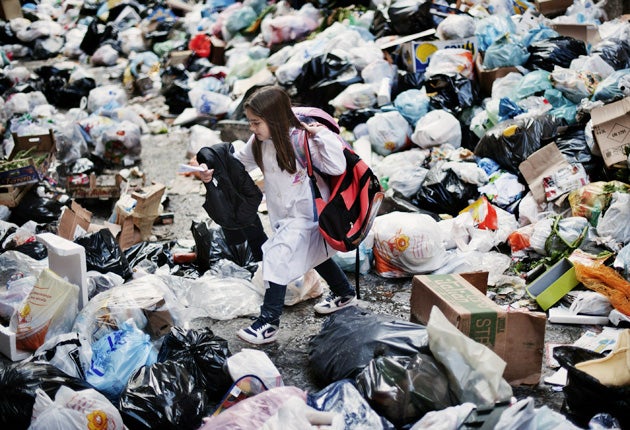Mountains of rubbish return to plague Naples

Your support helps us to tell the story
From reproductive rights to climate change to Big Tech, The Independent is on the ground when the story is developing. Whether it's investigating the financials of Elon Musk's pro-Trump PAC or producing our latest documentary, 'The A Word', which shines a light on the American women fighting for reproductive rights, we know how important it is to parse out the facts from the messaging.
At such a critical moment in US history, we need reporters on the ground. Your donation allows us to keep sending journalists to speak to both sides of the story.
The Independent is trusted by Americans across the entire political spectrum. And unlike many other quality news outlets, we choose not to lock Americans out of our reporting and analysis with paywalls. We believe quality journalism should be available to everyone, paid for by those who can afford it.
Your support makes all the difference.The streets of Naples are again piled high with stinking rubbish, threatening a public health crisis in the southern Italian city and further ratcheting up the pressure on Prime Minister Silvio Berlusconi.
A team of European Union inspectors made the depressing declaration yesterday, as the total amount of uncollected waste in the city appeared to be heading for the 3,600-ton mark by last evening, mirroring a similar crisis that attracted international interest two years ago. "After two years the situation is not very different," said the chief inspector, Pia Bucella, who is a in charge of the European Commission delegation sent to Naples to enforce European rules on waste management. "The refuse is there in the streets, and there is still no plan for treating or recycling it".
Health experts warned that again the crisis presented a significant health risk. "There is a health-and-hygiene danger that may turn into a serious risk for public health," said Dr Maria Triassi in a joint statement with a fellow member of the Italian Institute for Public Hygiene, Andrea Simonetti.
The most serious risks are linked to the presence of stray dogs, rats, cockroaches and insects, which "all carry gastrointestinal diseases", they said.
The first time around, at the start of 2009, an energetic intervention from Mr Berlusconi appeared to solve the problem as well as help his poll ratings. But the fundamental causes of the crisis were not properly tackled, and again the port's citizens are now going about their business holding their noses against the revolting smell.
The Naples Mayor, Rosa Iervolino Russo, said: "The city's not dirty, it's filthy. I wish I could invent new powers for myself so I could actually do something."
The crisis has been caused in part by the closure of regional dumps after fierce protests from residents who fear the sites pose a pollution risks to their communities. But the local mafia, the Camorra, also has an interest in ensuring there are inadequate official disposal facilities because it earns hundreds of millions of euros a year from illegal dumping.
Experts yesterday called on local and national authorities to clear the streets, open contested dumps, persuade more of the population to recycle and hasten the construction of incinerators.
"We're in a state of emergency," said Stefano Caldoro, the governor of the Campania Region which surrounds Naples. "Above all, we need to act quickly because we're 20 years behind in responding to this problem."
The reputation of the beleaguered premier rests to a large extent on his ability to resolve things for a second time, and Mr Berlusconi has indicated that he will travel to Naples as soon as he is able. Meanwhile, the smell of refuse and corruption wafting from the southern port is already adding to the Prime Minister's political woes.
The disturbing failure of local members of Mr Berlusconi's ruling People of Freedom (PdL) party to tackle the problem, is widely thought to lie behind the threat of the Equal Opportunities minister, Mara Carfagna, who is from the region, to quit the government. Nicola Cosentino, the head of the PdL in Campania, is under investigation for links with the Camorra. Some media in Italy suggest the crisis has prompted Ms Carfagna to approach the rival centre-right faction of the parliamentary Speaker Gianfranco Fini.
Join our commenting forum
Join thought-provoking conversations, follow other Independent readers and see their replies
Comments